337 Search Results for communication boards
May 27, 2014
by Carole Zangari -
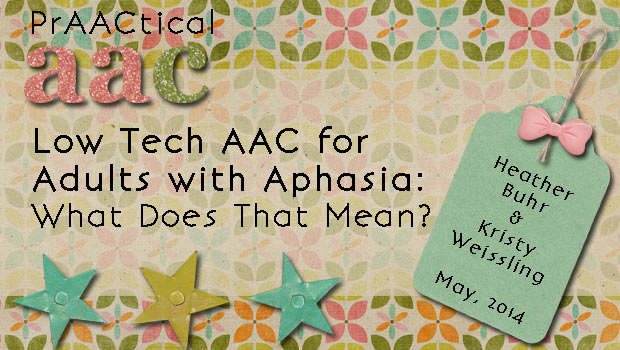
Aphasia Awareness Month is just around the corner, and getting us ready for that is this wonderful post on using low tech AAC with people who have aphasia. We’re delighted to welcome back our friend and colleague, Dr. Kristy Weissling, who is collaborating with Heather Buhr, to share some thoughts on this topic. ::::::::::::::::::::::::::::::::::::::::::::::::::::::::::::: For many, the term Augmentative and Alternative (AAC) brings to mind technology, speech-generating devices, and now – more than ever before – iPads. But as we know, AAC encompasses much more than that. We all use AAC when we make facial expressions or gestures, use symbols or pictures, or write. We would like to explore AAC and more “low-tech” options that help our clients express their thoughts, needs, wants, and ideas. Low-tech strategies can range from the use of written choice, to communication boards, to communication books. In this article we will specifically address communication... [Read More...]
May 26, 2014
by Robin Parker -
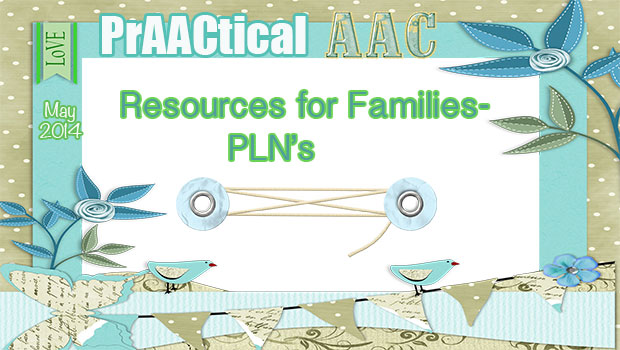
This month’s ‘Strategy of the Month’ has been focused on supporting families. To fully support families, it is essential to provide family friendly resources that can aid in creating Personal Learning Networks (PLN’s). The more families know and learn, the more likely the AAC learner will progress in their communication skills. Also, the more information families have, the better advocates they will become. And since families are one of the only constants in an AAC learner’s educational and life journey, the family is really the most important part the communication team. About AAC About AAC- ASHA AAC Institute- Parent’s Corner Center for AAC & Autism AAC -Family Resources Assistive Technology Resources- Autism Speaks Communication Matters Communication Books & Boards ConnectAbility http://www.setbc.org/pictureset/ Pre-made Communication Boards Help Designing Communication Books Free & Discounted AAC Apps Appy Malls Smart Apps for Kids Moms with Apps The iMums Apps Wheel *(categorized wheel of apps to... [Read More...]
May 14, 2014
by Robin Parker -
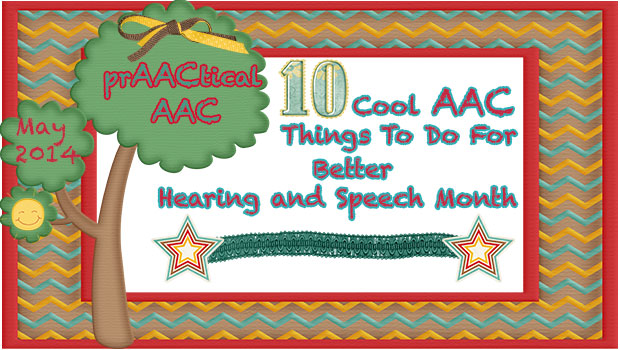
Learn with AbleNet University. Watch excellent free AAC webinars. There are live and recorded webinars so you can learn at your convenience. Share the information with colleagues and families. Give an AAC Gift. Create AAC informational bookmarks and distribute to educators, staff, and families. Print some free communication boards. Go to the PrAACtical AAC e-Tool Box and print out some great core word or activity specific communication boards. Put in your AAC clinic tool box or share with educators or families. Debunk AAC Myths. Use our AAC Myth buster quotes. Print and hang in public spaces so everyone can be an AAC myth buster. Learn and PrAACtice a New AAC System (device or app). Go to prAACtical AAC’s Teach Me Tuesdays and choose an app or device to learn- (Alexicom, Proloquo2go, PRC Accent, The Grid, Tap Speak Button & Sequence, Avaz, Tobii C8, Proloquo4Text, Go Talk Now Text, Nova... [Read More...]
April 10, 2014
by Carole Zangari -
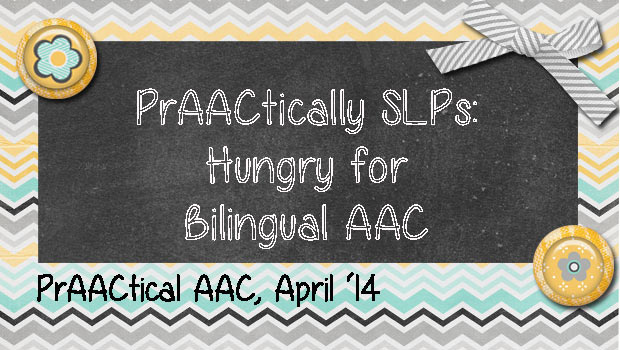
We are so excited to launch, PrAACtically SLPs, a new series featuring the voices of graduate students in SLP programs who do outstanding work in AAC. We start off with a wonderful group from the University of North Carolina at Chapel Hill. Allie Rodriguez, Caitlin Rich, and Megan Latta are second year SLP students who will be graduating in May. They recently concluded an AAC course taught by Dr. Penny Hatch, who continues to mentor them in the field of AAC and literacy. I met these energetic young professionals at the North Carolina Augmentative Communication Association Conference in February and was inspired by their passion. In this post, they tell us about their AAC experiences on a trip to Guatemala. Hungry for Bilingual AAC? Today, our population is becoming more culturally diverse, which, in turn, has caused our caseloads to reflect this change. There is a growing... [Read More...]
April 3, 2014
by Carole Zangari -
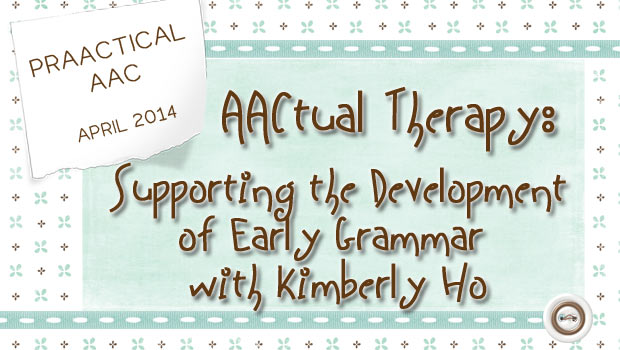
Our guest post for today is from SLP Kimberly Ho, an AAC specialist who operates a private practice, AAC Services. I met Dr. Ho many years ago when she was getting her master’s degree at Purdue University. She went on to get her doctorate and now consults for a number of public schools and works with individuals with AAC needs from preschoolers to adults. Kimberly is active in teaching (undergraduate and graduate courses), writing (published three articles in peer reviewed journals) and public speaking (15 presentations at regional, national and international conferences). In this post, she discusses some concepts in teaching grammar to people who are learning AAC. Traditionally, individuals with complex communication needs (CCN) were provided with communication boards or speech generating devices (SGDs) filled with topic specific vocabulary often called fringe words. The field of AAC is only just beginning to provide early communicators with access to Core... [Read More...]
March 24, 2014
by Robin Parker -
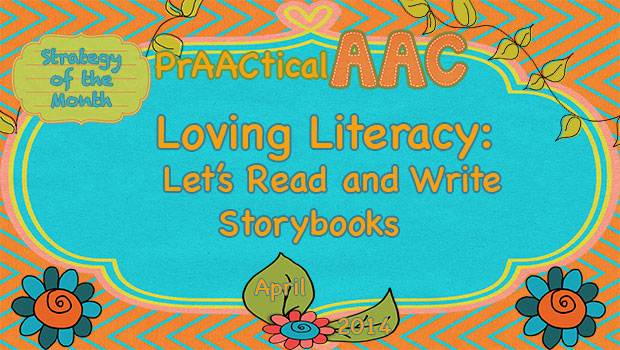
Literacy instruction involves lots of reading and writing. Last week, Carole discussed using storybook reading and the RAAP (Read, Ask, Answer, Prompt) strategy by Drs. Cathy Binger and Jennifer Kent-Walsh to teach communication and literacy. To use storybooks with all learners we need to have lots of books that are easily accessible. Books need to be accessible physically as well as through content and interest. It is lucky that with all of today’s on-line resources there is an abundance of ways to obtain as well as make and write storybooks. All learners can and should be be involved in both the reading and writing process. Not only do literacy skills improve but so do communication skills. Involving Learners in the Storybook Process Reader & Writer Vocabulary- Facilitate involvement by using reader and writer vocabulary. Refer to learners as “readers”, “authors”, “editors”, “publishers”, “critics”, etc. When you are treated and referred... [Read More...]
March 5, 2014
by Carole Zangari -
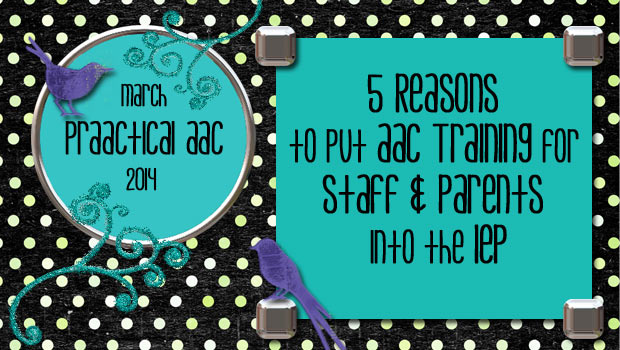
SLPs tend to love (good, relevant) professional development. We flock to conferences (15,000+ ASHA attendees this past November), sign up for workshops, and attend webinars. But for some reason, we are reluctant to request training as part of the IEP process, even when we’re not very confident in our work with the student. Maybe we don’t want to acknowledge our need for it, or admit that there is something we don’t know (gasp!). Perhaps we’d just rather not make waves. We may ask for training informally, but it doesn’t always get tied to specific students’ IEPs, and that may mean that our requests get overlooked. Here are a few reasons why you may want to put staff training into IEPs when needed. We need it. The complexity of the AAC field, diversity of this clinical population, and the rapid pace of change in technology make it very unlikely that any... [Read More...]
February 23, 2014
by Carole Zangari -
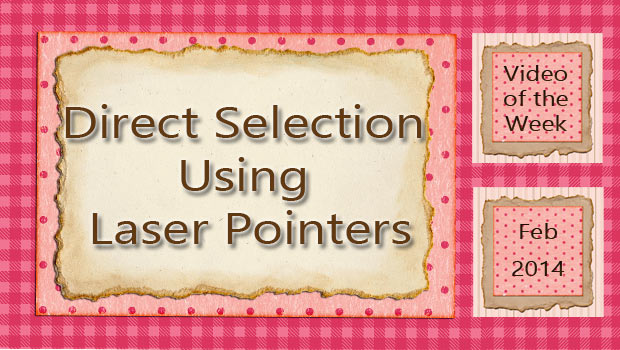
Looking for ways to support communicators with physical challenges? Laser pointers can be one way to provide access to communication boards and the alphabet. OT Margaret Cotts shows how it works in this interaction between a healthcare professional and a client with ALS. Although today’s featured video focuses on a client with ALS, this is an access tool that could work for individuals with other motor limitations as well. Direct Link to Video: http://www.youtube.com/watch?v=s0jlCq9QaM4
December 27, 2013
by Carole Zangari -
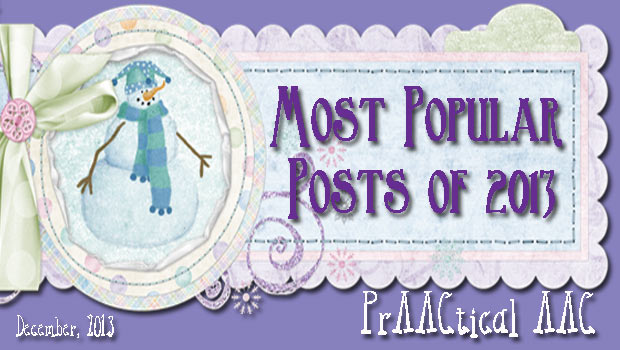
It’s been a wonderfully prAACtical year. Here’s a look back at our top 10 most popular posts. Anyone see any patterns? 🙂 How I Do It: Writing IEP Goals for Students Who Use AAC by Lauren Enders Teaching Core Vocabulary 5 Great Resources for Pre-Made Communication Boards Core Samples A Year Of Core Vocabulary Words AAC ‘Must Haves’ the the Classroom and Therapy Room Pivotal Skills for AAC Intervention: Aided Language Input How I Do It: AAC in the IEP by Lauren Enders Getting Started with Core Vocabulary More on Teaching Core Vocabulary
December 13, 2013
by Carole Zangari -
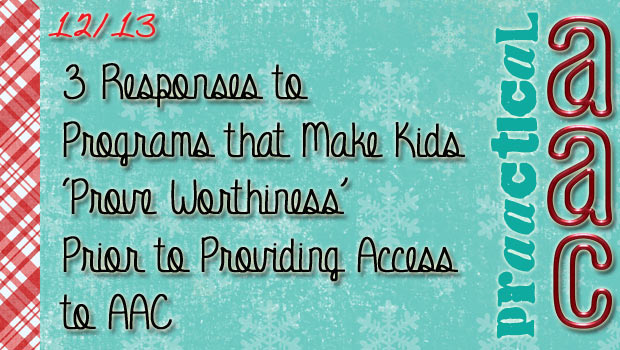
Like many of you, we continue to hear about programs that withhold AAC supports from children who are nonverbal or minimally verbal. Sometimes they point to the perceived lack of readiness that the child has for AAC, in general. Other times, they erect barriers, such as an artificial benchmark that insists that children start with no-tech AAC (e.g., communication boards, books, PECS) or low tech SGDs before ‘earning the right’ to sophisticated AAC options. As yet another year comes to a close, it is hard to believe that there are still programs, administrators, or, worse yet, our SLP colleagues who think they are truly justified in limiting access to AAC. How can we move beyond tearing our hair out, drinking excessively, or ranting to our friends? Here are some ideas. “Show me the evidence.” Ask for empirical support for the position that withholding access to AAC tools and strategies is more... [Read More...]









